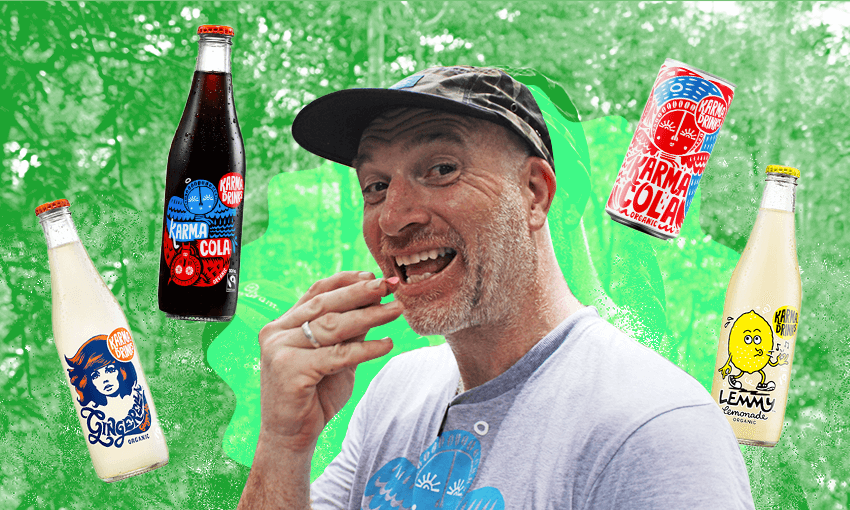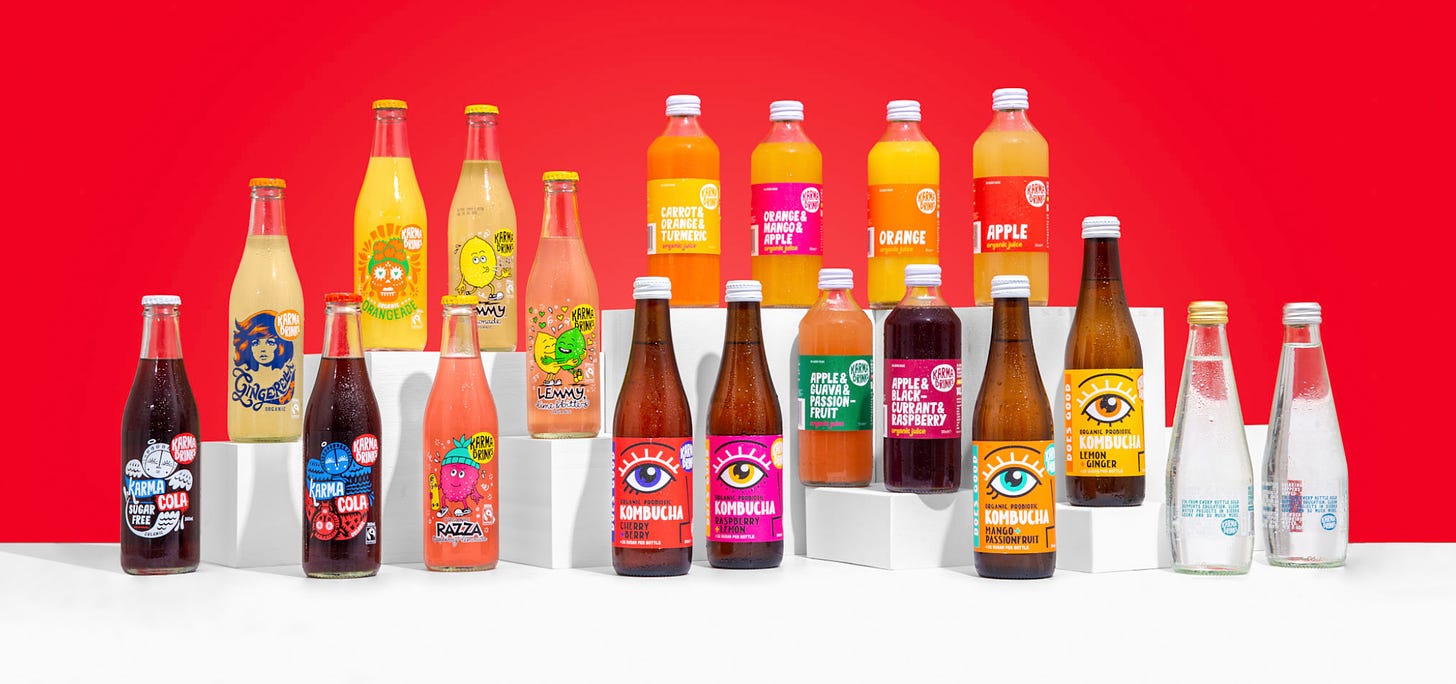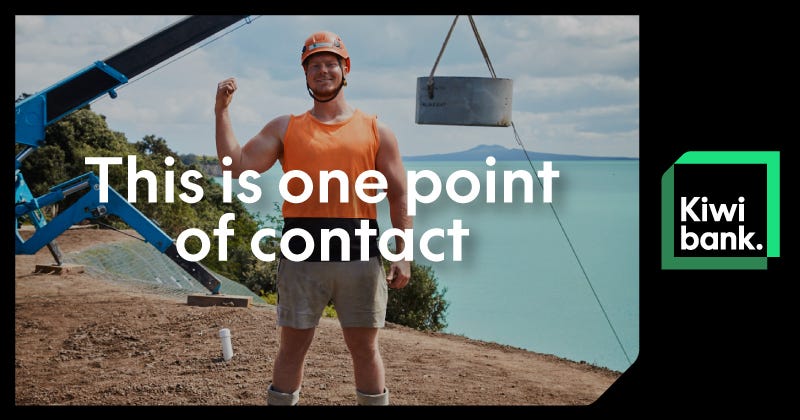The co-founder of a small food empire is ready to share his secrets
Simon Coley has learned a few lessons running banana, soda and oat milk companies for the past 12 years
Mōrena and welcome to Stocktake, created in partnership with Kiwibank.
I had quite a few responses to last week’s story about James Parfitt’s sea cucumber business – mostly, “Ew”. But I thought there was one issue I should address: Is it a sustainable product? The short answer is yes. Parfitt assures me he works with NIWA and his sea slug commercial catch limits are in the quota management system. So, if you can track them down, you can eat all the sea cucumbers you like – Parfitt’s not running out anytime soon. This week: Ten years with All Good.
-Chris Schulz, business editor
‘You don’t learn until you make mistakes … you have to make mistakes’
When I arrive at All Good’s head office in Auckland central, Simon Coley immediately introduces me at a high-powered business meeting. His company All Good has just started sending oat milk to Korea, and representatives are here checking in to see how it’s going. It’s new, but the reps tell me oat milk is starting to take off in Korean markets, where cafes use it in coffees and smoothies. “We just sent 11 containers over,” says Coley. “It’s only been three weeks.”
It’s another sign that things are all go at All Good, the company Coley started with brothers Chris and Matt Morrison in 2010. The trio kicked things off by importing organic Fairtrade bananas, an alternative to less sustainable options which All Good still supplies to supermarkets around the county. In 2012, the trio created Karma Cola and expanded to include a full range of organic sodas, including kombucha, juices and water. “We can fill a fridge,” Coley boasts.
More recently, All Good has added oat milks to their growing empire, selling more than one million cartons since 2020. As the reps depart, Coley sits me down in a boardroom full of banana-shaped bean bags and hands me one of the first All Good chocolate oat milks off the line. It looks delicious. When I ask if I can try it, he shakes his head. “I’m going to find you one from the fridge,” he says, then promptly forgets. I never do get to try one.
To be fair, there’s a lot on Coley’s mind. All Good is still recovering after being decimated by Covid, when 90% of its hospitality business dried up in the UK overnight. That figure repeated itself in Aotearoa, when Covid lockdowns landed here. After surviving the past two years, and recently celebrating Karma’s 10th birthday, Coley’s been in a reflective mood lately. “Is there anything valuable in what I’ve learnt on this journey?” he asks me tentatively after we chat for nearly an hour.
I reassure him that there absolutely is. Going into business is tough and Coley has the war wounds to prove it. He’s still here, fighting the good fight, but even if it hadn’t worked out, Coley’s a firm believer that it’s “much more interesting to do it than not”. Here are five of the most important lessons he’s learned during his time in business…
1. Be prepared to make mistakes (especially at the start)
When All Good began importing bananas, Coley and his business partners had big dreams of helping Samoan families convert backyards into banana plantations and earn a living wage. It didn’t quite work out how they planned. “We didn’t know enough about ripening,” says Coley. “We didn’t figure out how delicate they’d be.” Instead, All Good dried the Samoan bananas and sold them as chewy fruit snacks. They then found a co-op in Ecuador able to supply fresh sustainable bananas that could survive the trip. The lesson? “You start with a bit of healthy naivety,” says Coley. “You don’t learn until you make mistakes. You have to make mistakes.”
2. Pick your time to expand (and a little luck goes a long way)
Two years after kicking things off with bananas, Coley says All Good needed to expand if it was going to survive. “The bananas were going well, but they were so volatile,” he says. “We needed other products.” They noticed a gap in the cola market: no one was offering Fairtrade or organic products. Thanks to a UK hook-up, a bag of organic cola nuts was sourced from Sierra Leone and transported to Aotearoa. “No one noticed it going through customs,” says Coley, who has since learnt he should never have received the products – they needed an organic passport to get through. That piece of luck helped speed up the cola creation process, and by 2010, Karma Cola was born.
3. Ride out the highs (and the lows, no matter how bruising)
The first bottle of Karma Cola was sold in Auckland’s Kokako Cafe 10 years ago. By 2014 the range was being sold in the UK. The drinks company has been so successful it courted investment, its range is now sold in 23 countries and Karma Drinks been separated out from All Good. By the start of 2020, both companies were in good shape. Then you-know-what happened. “Covid gave us a rattle,” admits Coley. Riding out lows is part of being in business, he says. Each time a rough patch comes along, he believes it can be used to make the company stronger. “For a while, every Christmas we thought we were fucked,” he says. His advice to anyone else going through tough times? “Just keep going.”
4. Embrace change at every turn (even if it means firing yourself)
Coley and his business partners thought they’d found a new way of leading a company. With three founders, each with different backgrounds and experiences, they took turns at being CEO. “We didn’t know what we were doing,” says Coley. “We had to basically fire ourselves. It was horrible.” Recognising they needed one voice at the top was the start of sending the business in the right direction. Now, they have a separate CEO and a general manager who make many of the big decisions. “It’s made a big difference,” says Coley. “We’ve streamlined the operation … we’re developing resilience.”
5. Have a reason to do what you do (and use it as part of your story)
From day one, All Good has tried to do good things at every step, treating its suppliers, staff and customers as well as possible. You can’t call a company All Good if it isn’t, says Coley. “We couldn’t call it ‘Karma Cola’ if the people harvesting it weren’t doing well,” he says. So, in West Africa, where their cola nuts are harvested, Coley can point to bridges being built, kids going to school, and entrepreneurs growing businesses, all because of the money they’ve put back into the community there. “Our shared values have kept us going,” he says. Customers, he says, connect to that mission. “The change that we’re enabling is significant. It’s emotional. We owe them something.”
Business banking made simple, with Kiwibank
Kiwibank wants to help your business to soar, just like it has with thousands of other business banking customers. Kiwibank’s business banking experts can also manage your everyday banking, so you have one point of contact for both – saving you time and making your life easier. Find out more about how you can simplify your banking with Kiwibank.
A night inside the dragon’s lair
Once a year, 10 CEOs get to pitch their start-ups to some of the country’s wealthiest investors. The Icehouse Ventures Showcase is a glitzy, glamorous event full of high-energy music, luxury brands and expensive watches – and a lot of backstage nerves. It’s a place where big business decisions are made, and it gives us insight into how we might live our lives in the future (Sharesies, Halter and Crimson all grew thanks to this event). I was delighted to spend the night talking to everyone I possibly could. You can see how it played out here.
What’s going to stop the rocketing cost of living?
Petrol, rent, mortgage rates, grocery and power bills, a good old flat white – everything seems to be going up in price right now. Can it stop? Will it stop? If so, how? Stuff’s Kate Newton examines the cost of living crisis that happened in the 70s and 80s to find out if what happened then could happen now. Her story includes several great graphs, an epic opening line, and a reference to Harry Styles – read it here.
Economics 101 for housing supply
“When there’s a big increase in price, a whole bunch of new suppliers are supposed to come onto the market to pull that price back down again”, says Bernard Hickey. But that hasn’t happened in Aotearoa for the past 30 years, and many are trying to work out why. On the latest episode of When the Facts Change, Hickey dives deep into the demand and supply factors behind our endemic housing shortages with Kiwibank economist Jeremy Couchman, including what they might mean for house prices.
A handful of quick links…
We’re getting Monday, September 26 off to mourn the Queen’s death, but Business NZ boss Kirk Hope says that after Covid and the impact of lockdowns, the hit to small businesses is “a bridge too far … we prefer not to have that”.
93% of SME owners and decision-makers plan to vote in this year’s local government elections. That’s according to a new survey by MYOB. That’s also a pretty huge number as overall turnout in 2019 was 42.2%.
Nine-year-olds can buy Lotto tickets, and they are, reports Guyon Espiner in his continuing RNZ series looking into state-sanctioned gambling. One researcher tells him this “normalises gambling behaviour”.
Remember the Fyre Festival debacle? Promoter Billy McFarland is out of jail and, according to this incredible first interview with the New York Times, he’s already planning his next venture, which will be something “tech-based”.
Finally, the watches are bigger, the iPhones more expensive and Airpods get an upgrade. Here’s everything you need to know about Apple’s recently announced new range of products, including an iPhone 14 that costs $3000.
September is birthday month for The Spinoff. We’ve come a long way since 2014 and that is in no small part thanks to our members. Their generous support underpins all our work and has meant we are able to cover more areas of life in Aotearoa, to tackle more stories about our people and issues impacting our communities. From our ongoing coverage of inequality and the cost-of-living crisis, to political reporting and our focus on te ao Māori, it’s important mahi and we can’t do it without you. Let’s keep a good thing going - tautoko mai, donate today.
If you liked what you read today, share Stocktake with friends, family and colleagues.












